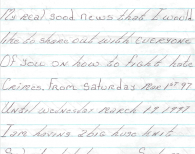Catherine Jo of Salem, Oregon sent us this handwritten note along with her donation. Catherine Jo, like Katie from Glencoe, IL, raised money for Not In Our Town by selling hand-made goods and donating her profits.
Catherine Jo's message of joining together to "build a solid steel fight" against hate and intolerance has inspired us for years. If you also find Catherine Jo's words inspiring, we invite you to join in her footsteps and donate to Not In Our Town.
Working Group Dept.
Not In Our Town
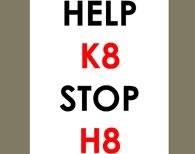
Today we share with you one of our newest supporters, Katie, a 13-year-old from Glencoe, IL. We are so grateful to those who feel compelled to look behind the camera and support our work. We invite you to join Katie and donate to Not In Our Town.
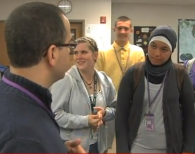
Scene from Light In the Darknes
In Not In Our Town: Light in the Darkness, we witness how students can become upstanders, even in the wake of violent hate crimes. The 60-minute documentary premiered on PBS in 2011, but is now available for purchase as a 27-minute classroom version.
This film is extremely pertinent to the educational community for several reasons. In addition to the importance of learning about how the community came together to respond to hate, it brings up serious questions for educators, for example:
How did these young people routinely participate in what they called "beaner-hopping" ("beaner" is a racial slur and "beaner-hopping" refers to beating up Latino immigrants) without their teachers and parents noticing?
Why did other students who knew what was going on never speak up?
What was the impact of the media's hateful rhetoric on the attitudes of youth in the schools?
Educators across the U.S. have begun to use the film as a springboard for addressing issues of immigration, bullying, and teaching students to be upstanders (speak up and take action).
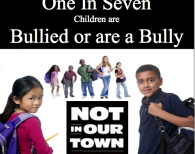
On Sunday, the citizens of Marshalltown, Iowa launched a united effort to help stop bullying before tragedy strikes.
The citywide Not In Our Town campaign is organized by an anti-bullying committee comprised of community, education, civic and law enforcement leaders. This core group of 25 were brought together by the Marshalltown Times-Republican. Through a series of film screenings, community events, and public speakers, the campaign aims to bring all forms of bullying to light to make Marshalltown a safe and inclusive city.
"We want to see if we can be ahead of the curve as a community in preventing bullying," said Mike Schlesinger, publisher of the Times-Republican, said in a June 3 article. "We want to look at ways to prevent school bullying, but also workplace bullying, domestic violence and other types of bullying among adults."
According to the Times-Republican, a youth survey showed that 41 percent of the city's students had been bullied in the last 30 days, and 11 percent of those students didn't go to school because they felt unsafe.
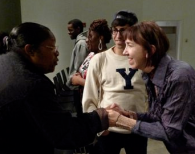
New York City immigrant groups and communities joined together to watch Not In Our Town: Light in the Darkness during Immigrant Heritage Week in late April.
The film was screened eight times across the city—in Queens, Chinatown, Brooklyn and the Bronx—sparking discussions about how to address the challenge of hate and bias.
At the Bronx Museum, NYC Commissioner of Immigrant Affairs Fatima Shama led the post-screening discussion with filmmaker and executive producer Patrice O'Neill. The event was attended by members of the Bangladeshi, West African, African-American, and Puerto Rican communities. Three groups at the event pledged to hold other screenings in the Bronx in the coming month.
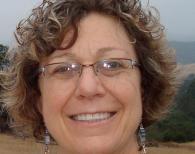
By Becki Cohn-Vargas
Dr. Becki Cohn-Vargas, Not In
Our School Director
This article originally appeared in Edutopia on April 24, 2012. Dr. Becki Cohn-Vargas is a veteran educator as well as the director of Not In Our School.
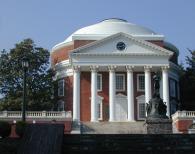
"This history of slavery, segregation, discrimination, and racism has been so well hidden that it has allowed the university community to isolate itself from the continuing legacy of that history, even as elements of the past continue to shape the university, neighboring communities and beyond."
With a rich history that dates back to 1819, the University of Virginia (UVa) in Charlottesville, VA was founded by Thomas Jefferson and is one of the oldest universities in the nation. While the founding father's legacy is the shining testament to the university's success, it also veils a troubled history of racism and intolerance that, since university policy changes led to the enrollment of the first African-American undergraduate student in 1950, continued to resurface on the campus more than half a century later.
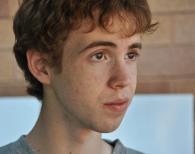
From ColorLines: Read article, "Hate Speech Flourishes Online"
Being an upstander is not easy. Just ask J. Ryan Leach, a student at the University of Virginia, who has been a rare voice in online forums to speak up for tolerance. In his hometown of Mechanicsville, VA, crime stories in the news attract racist comments.
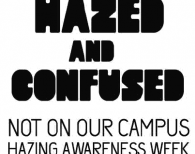
Hazing: any action, taken or situation created intentionally that causes embarrassment, harassment or ridicule, risks emotional or physical harm, to members of an organization or team, whether new or not, regardless of the person's willingness to participate.
The Alpha Theta Phi sorority at the University of Redlands is breaking new ground. In October, the students held a Not On Our Campus week to bring awareness to hazing, pledging to stop the hurtful—and sometimes fatal—practice on university campuses.
Earlier in the year, university and sorority alumnna Lauri Massari stepped forward to conduct an anti-hazing training, as a service to the Office of Student Life. But she took it one step further, offering a $500 scholarship to conduct a Not On Our Campus week of activities, the first of its kind at the university.
"This has not been an easy task for these young women because fraternity and sorority traditions at the University of Redlands are 100 years in the making and do not readily embrace the changes required in eliminating hazing," Massari said.
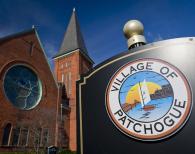
By Paul Pontieri, Mayor, Incorporated Village of Patchogue
Mayor Paul V. Pontieri
At the 2011 Congress of Cities and Exposition in Phoenix, Mayor Paul Pontieri of Patchogue, N.Y., helped lead a workshop featuring segments from the PBS documentary Not In Our Town: Light in the Darkness, about the community response to an anti-immigrant hate crime killing in his town. The session, sponsored by NLC’s Municipal Action for Immigrant Integration program (MAII) launched a productive conversation with mayors and other city leaders about how to effectively address these complex challenges. Mayor Pontieri will appear at a film screening and discussion on February 8, 6:30 p.m. at Scottsdale Community College Performing Arts Center in Scottsdale, Ariz.
